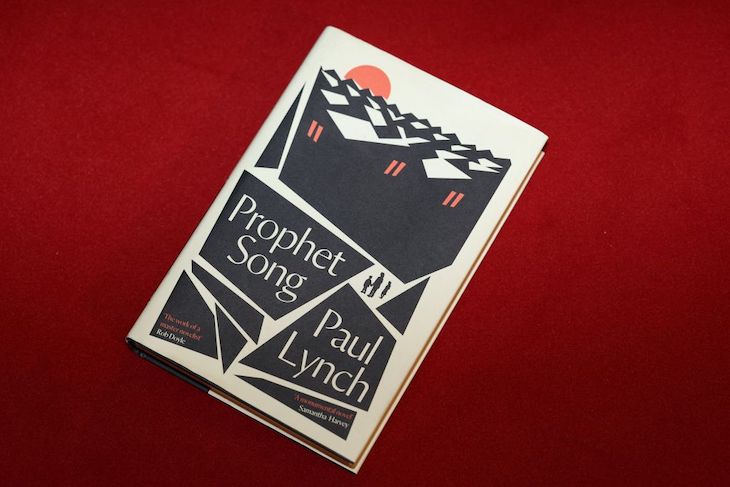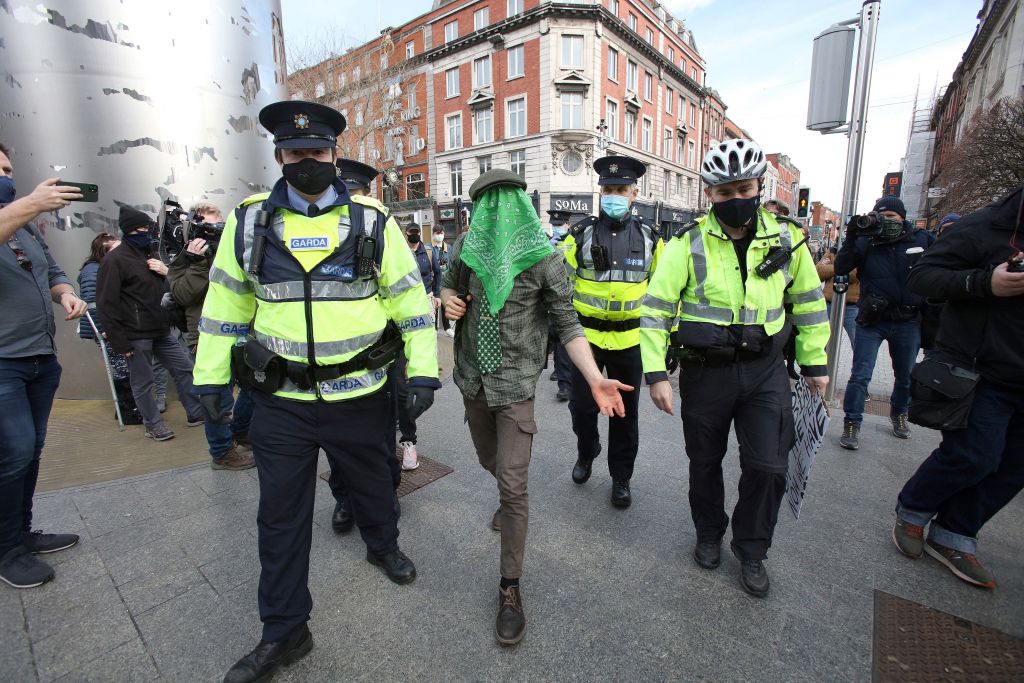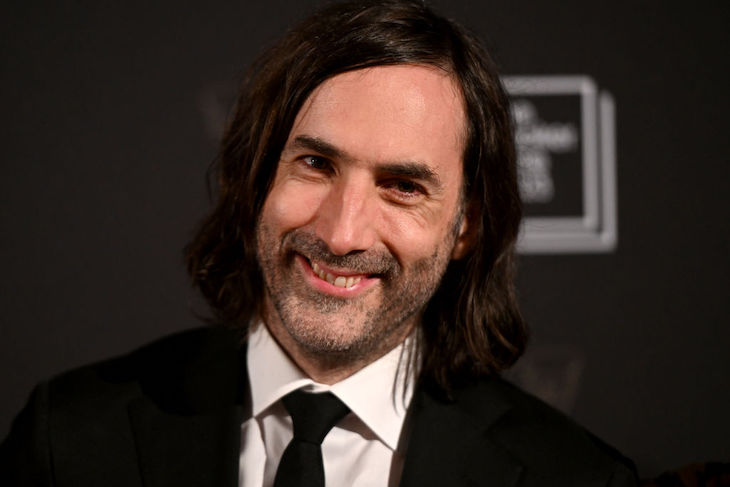The 2023 Booker winner, Paul Lynch’s Prophet Song, is a vastly admirable book, but there is something deeply odd about it: it is a novel about a dystopian coup that takes down Ireland’s ‘liberal democracy’, not about the dystopian coup that was actually happening at the time it was written.
By definition, most novels are stories rendered from imagined events, set in the past, present or future. But there are occasional examples that are fictionalised accounts of real events – almost always, by definition, from the past, and rather contradictorily termed ‘non-fiction novels’ – as well as imagined vistas from the future – almost always dystopias, most famously, George Orwell’s 1984.
But what are we to make of a novel depicting a fictional dystopia that was written while a real dystopia was unfolding outside the window of the room in which it was written? ‘Untruthful fiction,’ perhaps, or ‘novelised evasion’. For Prophet Song, the fifth novel by the Irish writer, is likely to establish its author’s reputation, though not as the 21st century’s Orwell or Solzhenitzyn. A novel about an imagined dystopia, written during the infancy of an actual dystopia, is surely a fascinating concept (perhaps the plot line of a novel), but also a different yardstick by which the book must be judged than if the actual dystopia had not happened.
There was no shortage of dystopian material outside Paul Lynch’s window had he chosen to lift the blinds
Prophet Song is a book of which it might be said that the standard publisher’s indemnifying ‘This is a work of fiction’ blurb was perhaps never quite so true. It depicts a coup, occurring solely in Ireland, imposed by a ‘far right’ populist insurgency. In shortlisting the book in September, the Booker judges declared:
‘Paul Lynch’s harrowing and dystopian Prophet Song vividly renders a mother’s determination to protect her family as Ireland’s liberal democracy slides inexorably and terrifyingly into totalitarianism. Readers will find it timely and unforgettable. It’s a remarkable accomplishment for a novelist to capture the social and political anxieties of our moment so compellingly.’
The Daily Telegraph gushed that it was ‘being touted as ‘Ireland’s 1984.’ The difficulty is that Ireland’s real life 1984 was already playing out, and, though resonating dissonantly and recurrently with the content of Prophet Song, might be termed the ideological antithesis of the coup depicted by Lynch. Ireland’s ‘liberal democracy’ had already slid inexorably and terrifyingly into totalitarianism, though not at the hands of right-wing populists, but at the hands of liberal democrats implementing tyrannical decrees in the spurious name of public health.
Here was a dystopia that locked people into their homes and allowed them out only for short periods of daily exercise, subjecting them to arrest if they demurred; that forced growing children to stay home, away from other children, save for short periods each day; that insisted the elderly be left to die alone, helping them on their way with overuse of lethal sedatives, severed from the support and affections of their families; that demanded the wearing of synthetic gags to cover the human mouth and nose in public; that threatened people with the risk of unemployment and/or exclusion from society for declining to accept into their bodies a vaccine imposed with the full weight of state coercion, creating a cultural apartheid as between those who had taken it and who hadn’t. There was no shortage of dystopian material outside Paul Lynch’s window had he chosen to lift the blinds, and it could scarcely be said that this actually existing reality lacked for action or plot potential.

These circumstances render Prophet Song one of the strangest books of all time – not so much for its content as for what it does not contain. It is strange for its Nelsonian knowledge and contrived ideological purblindness. It is strange for its timing and its utter absence of irony concerning its own evasions. A still more intriguing aspect is that none of the mainstream reviews of Prophet Song have mentioned these strange circumstances, instead extolling the book’s ‘warnings of the potential woes of a modern-day fascist purge’ and its ‘darkly important message about a particular moment in time,’ without referring to the fact that the woes had already unfolded and the ‘important message’ had come all too late.
‘We would do well not to look away,’ trumpeted the Guardian, seemingly oblivious that ‘we’ already had, or perhaps that ‘we’ had been looking all the while but had declined to understand what ‘we’ were seeing.
The story is engaging but also enraging
In other words, the latest winner of the Booker prize for the best novel in the English language has the distinction of depicting the unfolding of a fictional dystopia that has not and is unlikely to occur, whereas, even in the course of its writing, its author was presented with the option of depicting an existing dystopia in the process of unfolding in the streets outside his writing room, but chose to spurn this for considerations – who can say? – of ideology, commerce or career.
The dominant focus of the book is the earthly purgatory of Eilish, a wife and mother trying to keep her family together while her husband, Larry, is incarcerated – on account of his work as a trade unionist – by a government with democratic pretensions, but with constant intimations of some kind of nationalist authoritarian bent.
Larry has attracted the attentions of the Irish secret police, the GNSB (Garda National Services Bureau), acting on behalf of the National Alliance, a sketchily drawn populist junta, which has dismantled Irish democracy and declared an emergency under an Emergency Powers Act, though these aspects are blurry, with the in-focus aspects being generally the intimate, domestic ones. The story is engaging but also enraging, as you begin to suspect that Lynch has sought to sidestep what was going on under his nose, partly by locating his tale in the intimate rather than the public realm, and partly by drawing very broad strokes to create a kind of fog of authoritarianism on the outside, bearing in. He achieves this by avoiding absolute realism and creating a kind of comic-strip atmosphere in which the characters have full play to function as realish people, and yet appear to exist in some kind of ironic bubble in which nothing seems to be exactly naturalistic, and in which you are never allowed to forget that you are ‘reading a novel’.
In the early chapters, I presumed his depiction of a nationalist-populist coup was being soft-focussed with a view to zooming in as we went along, and would later get to delivering close-ups of the personalities and ideas that bore down upon his characters. But that never happens. The spectre of right-wing nationalist tyranny remains just that, a spectre, like a video game playing in the background, delivering curfews and ultimatums and food shortages and draft mandates and summary executions, but never acquiring a face or a voice. Nowhere in the book is there more than a couple of half sentences hinting at the ideological basis of the insurgency, and everyone in the book is apolitical in one way or another. I’m not sure whether this is a deliberate late attempt by the author to duck the issue of his chosen tyranny’s filigreed nature (but without endangering the book’s marketing or publicity strategy), or simply a device to highlight the domestic impact of the horror depicted. It is as though the ideological background is in black and white, and the lives of the family at the centre of the story happen in colour. This is all perfectly legitimate, stylistically speaking. The problem is that art does not happen in a vacuum, and nor is it the same as entertainment.
Imaginatively, Prophet Song is a magnificent achievement, powerful on its own flawed terms. If it could be regarded purely as ‘fiction,’ it would be harmless, a little cautionary in a broad-stroke futuristic kind of way, and worthy of critical approval and even prizes. It fails not as fiction, but as literature, a different species, rooted in reality and truth and – yes – prophecy.
The story is dark, disturbing and compelling, but it is founded on an untruth
Sometimes, Lynch’s insight into the nature of the existential shock of an event such as he depicts is quite devastating. Which of us who have endured these past 45 months of horror could not relate to this description of the uncomprehending early response of Eilish to the abduction of her husband and the attendant brutally altered nature of reality?:
She finds herself breathless, seeking upward for air, moving into the living room, seeking something within her thinking as she picks up the remote and finds a news channel and puts it on mute. This sense now she is living in another country, this sense of some chaos opening, calling them into its mouth.
Since I came across and read the book after it was long-listed in August, I have been all but certain it was going to win, as much as for its objective quality (on its own intrinsic terms, and as a piece of writing), as for the reason that it (unwittingly?) provides the establishments of our societies with a kind of alibi for their involvement in an actual authoritarian ‘event’.
In some responses, the bestowing of the Booker prize on such a book might be seen as an elaboration of the avoidance that has attended the deep meaning of this event – after all, if we still give prizes to fictional conceptions of totalityranny, we must still be the democratic West!
This is the disqualifying factor in respect of any attempt to elect Lynch the ‘new Orwell,’ as already mooted by some of his colleagues. When the sky is falling, it is hardly a cause for approbation when someone shouts a warning about a possible imminent thunderstorm. Orwell’s 1984 caught the public imagination in the 1950s, 1960s and 1970s because its dreads were all in the future. But is there merit in depicting a futuristic dystopia if an actual present one has already made landfall?
The nagging ache within the book is the constant sense that the author clung to a prior media talking-point – the populist ‘threat’ – even though, for all intents and purposes, what was happening around him while he was writing it was close to the opposite: a previously liberal society sliding into authoritarianism because of the venality and cowardice of liberals generally and liberal politicians in particular.
Accordingly, Prophet Song amounts to a kennel-full of dogs not barking, which is to say that, outside of its own intrinsic workings, it could be viewed as a piece of unmitigated propaganda. There is a chance, of course, that this is entirely unwitting and happenstantial – perhaps the author was so immersed in his work that he did not notice the kicks he received trying to access the supermarket without his face-nappy? – but even more astounding is that a book like this can be received by an entire culture in which everyone, including the cheerleaders of the lockdown, are able to speak about its ‘prophetic qualities’ with straight faces.

Perhaps, it will be argued, he may have been seeking to protect his work from cultural attack – from cancellation, even – and so disguised his theme to have it seem something like its opposite ideological iteration? And yes, it is (if only theoretically) possible that, in presenting a vague spectre of rightist populism rather than the left-liberal totalitarianism that is actually gaining ground, he might well have justified the use of a coded device, in the tradition of literary obliqueness that has often been called into service in times of extreme political oppression. But these attempts at absolution are purely theoretical, for their defences are destroyed by the existence of Lynch’ss ruminations in advance of the writing process. Before he started writing, he published a prospectus of Prophet Song by which it can now be measured:
I thought about Brexit, Trump, and the forces gathering on the horizon: The Freedom Party in Austria. The National Front in France. The People’s Party in Denmark. Golden Dawn in Greece. Jobbik in Hungary. Law and Justice in Poland. Party for Freedom in the Netherlands. A tectonic shift was occurring in western democracies. I thought, too, about the implosion of Syria and the west’s largely indifferent response to its refugee crisis. The citizen’s regret is the novelist’s calling. I wanted to understand where all this might lead. I began to wonder what Ireland would look like with a populist government. I wondered, too, what it would be like to live in a democracy drifting towards tyranny. I asked myself, how much power can an individual wield when caught within such an enormity of forces? Prophet Song took shape as a dystopian novel set in our own time.
All this reads now as newsroom water-cooler guff among a bunch of lefty journalists awaiting the latest press release from the government press office. Or, perhaps, a far more ominous possibility: Lynch still thinks it a fearless summary of the parlous state of European democracy. As he sat at his desk in 2020 and 2021, he would not have needed to look distantly to the horizon to find inspiration for the imagining of how it might be to live in a democracy drifting towards tyranny, with nary a populist in the frame. In the circumstances in which we find ourselves now – with Irish bloggers and tweeters, not trade unionists, threatened with imprisonment for ‘hate speech’ – the stench of avoidance about this book is impossible to ignore, because our civilisation, and not just the Irish part of it, is in actual real and present danger, if indeed it is not already too late for a salving intervention.
The story is dark, disturbing and compelling, but it is founded on an untruth, told at a moment when the truth was clear to be understood; a cautionary tale about a bogus claim concerning a threat that does not exist other than in the manipulative imaginations of truly dark actors, the very forces presenting the real and actual threat overshadowing the three-dimensional world beyond the pages of Paul Lynch’s book. The skill with which Lynch depicts the human aspects of the authoritarian clampdown is actually all the more maddening for its veracity and verisimilitude – great creative skills misused in acts of misdirection, trivialisation and avoidance.






Comments